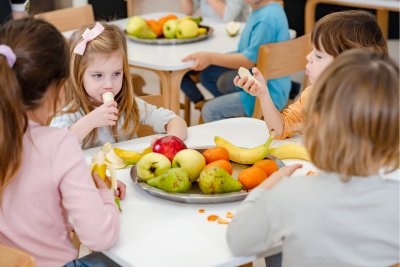Responding to the findings of the government-backed Food Growing in Schools Taskforce [1], set up in the response to a report co-authored by the Children’s Food Campaign [2], Coordinator Malcolm Clark said:
"We enthusiastically welcome the Taskforce's report, which provides compelling evidence that food growing in schools is an "essential" tool in improving children's health and wellbeing [3]. The case for making every school a food growing school, which we first set out over a year ago [4], has now been overwhelmingly validated.
However, we are very worried that the government looks likely to throw this report on the compost heap, rather than offering practical support towards implementing the recommendations.
Secretary of State for Defra, Caroline Spelman, rightly recognises that we must all “work together to turn the recommendations of this report into reality, and get more kids growing food” [5]. However, her department has so far been silent on how they – or the rest of Whitehall – will be playing their part.
We are waiting to hear how government departments will take up the Taskforce's key recommendation that there should be “a policy emphasis on promoting food growing in schools” [6]. We are also waiting to see how the upcoming second stage of the National Curriculum Review will recognise the contribution which food growing makes to learning, particularly in STEM subjects (science, technology, engineering and maths), and incorporate the impact of food growing in schools more generally.
The silence from Defra is even more disappointing given the Prime Minister’s recent championing of the role that government should play in supporting schools to tackle obesity and promote healthy lifestyles [7]. Just as every school has computers, every school should also have a food-growing garden used by all pupils and teaching staff who have food-growing skills and knowledge.
Without sufficient guidance, support and funding, even those schools which have introduced food growing are not able to reap the full benefits for their pupils. We need the government to be more green-fingered and to nurture food growing in schools – only then will it thrive in every school and improve the well-being of all our schoolchildren."
Ends
For further information and interviews, please contact Malcolm Clark on 0203 5596 777 or 07733322148, or malcolm@sustainweb.org
Notes:
1) The Food Growing in Schools Taskforce consisted of representatives with interests and expertise in the delivery of food growing in schools. It was Chaired by Garden Organic and included leaders and practitioners from schools, charities, corporate providers, community organisations, media, government, including Defra, The Department of Health and the Department of Education. The Taskforce engaged with over 150 organisation and schools and used data from an independent, national survey of 1300 schools to produce this report and recommendations. Full report: www.gardenorganic.org.uk/foodgrowinginschools
2) The Children’s Food Campaign aims to improve young people’s health and well-being through better food – and food teaching – in schools and by protecting children from junk food marketing. We are supported by over 150 national organisations and co-ordinated by Sustain: the alliance for better food and farming. For more information see www.childrensfood.org.uk
3) Food Growing Taskforce Executive Summary – Recommendations, p20
4) 'Every School a Food Growing School', Children’s Food Campaign report, Nov 2010 https://www.sustainweb.org/publications/?id=186
5) Food Growing Taskforce Executive Summary – Foreword by Caroline Spelman, p2
6) Food Growing Taskforce Executive Summary – Recommendations, p20
7) Response dated 13 Feb 2012 by the Prime Minister to a joint letter to him concerning practical cooking lessons in schools https://www.sustainweb.org/resources/files/other_docs/CFC_PM_response_29Feb12.pdf
Children's Food Campaign: Campaigning for policy changes so that all children can easily eat sustainable and healthy food.








